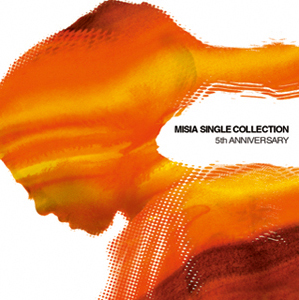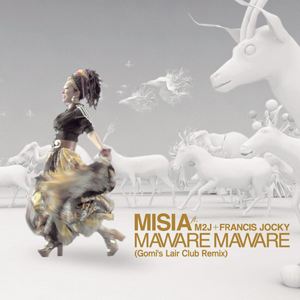
Misaki Itō, commonly known as Misia and stylized as MISIA, is a Japanese singer and songwriter. Born in Nagasaki, Misia moved to Fukuoka at the age of 14 to pursue a recording career. There, she continued her secondary education and briefly attended Seinan Gakuin University before withdrawing to focus on her musical career. She was signed to BMG Japan in 1997, after auditioning for record producer Haruo Yoda.

The discography of Japanese R&B singer Misia consists of nine studio albums, three compilation albums, one extended play (EP), one live album, six remix albums, twenty-six singles, twelve promotional singles, eighteen video albums and thirty-seven music videos. In 1997, Misia signed a recording contract with BMG Japan and joined the then up-and-coming talent agency, Rhythmedia. Under the sub-label Arista Japan, Misia released her first single, "Tsutsumikomu Yō ni..." in February 1998, followed by "Hi no Ataru Basho" in May. In June, her debut album, Mother Father Brother Sister, opened at number three on the Oricon chart. The album peaked at number one three weeks later and stayed in the top five for eleven consecutive weeks. Mother Father Brother Sister was certified double million and won a Japan Record Award for Best Album, as well as a Japan Gold Disc Award for Pop Album of the Year. In 2000, Misia's second studio album, Love Is the Message, debuted at number one and was certified double million. It won a Japan Record Award for Best Album and a Japan Gold Disc Award for Pop Album of the Year. The album spawned three top ten hits: "Believe," "Wasurenai Hibi" and "Sweetness." Misia's first remix album, Misia Remix 2000 Little Tokyo, was released three months later and shot to number one. It sold over 800,000 copies and is the second best-selling remix album of all time in Japan.

"Luv Parade/Color of Life" is the fifteenth single by Japanese recording artist Misia. It was released on July 5, 2006 as the first single from Misia's seventh studio album Ascension.

Love Is the Message is Misia's second studio album, released on January 1, 2000. It sold 1,349,650 copies in its first week, making it the 23rd highest debut in Japanese history, and peaked at #1 for two consecutive weeks. It went on to sell over 2.29 million copies, making Misia one of the three acts, alongside Globe and Chemistry, with the second most consecutive double million albums, behind Hikaru Utada. Love Is the Message was the recipient of the award for best album at the 42nd Japan Record Awards. The album jacket was shot during sunrise at the summit of the Haleakala National Park in Maui, Hawaii. Love Is the Message is the 56th best-selling album of all time in Japan.

Marvelous is Misia's third studio album and first self-produced album, released on April 25, 2001. It sold 881,150 copies in its first week, peaked at #1 for two consecutive weeks, and spent five weeks in the Top 5. The first pressing of the album came in sleeve case packaging. Marvelous is the 118th best-selling album of all time in Japan. It came in at #8 on the overall yearly chart, however Marvelous was the second highest selling original album of 2001, behind Hikaru Utada's Distance.

Misia Greatest Hits is Misia's first compilation album and last release with Arista Japan, released on March 3, 2002. It sold 587,210 copies in its first week and peaked at #1 for two consecutive weeks. Misia Greatest Hits was the highest selling compilation album of 2002. It is the 30th best selling compilation album and 90th best selling album overall of all time in Japan. The album includes an enhanced music video for the unreleased track, Amai Koibito, featuring Melonpan.

Misia Remix 2003 Kiss in the Sky: Non Stop Mix is Misia's fourth remix album, released on April 23, 2003. It sold 31,648 copies in its first week and peaked at #3. Disc one is mixed by DJ Ta-shi whilst the second disc is mixed by DJ Gomi.

Hoshizora no Live: The Best of Acoustic Ballade is Misia's first live album, released on October 22, 2003. It sold 72,351 copies in its first week and peaked at #2. The album features live recordings of Misia's outdoor acoustic concert held in Okinawa on August 15 and 16, 2003.

Misia Single Collection: 5th Anniversary is Misia's second compilation album, released on December 3, 2003. It sold 52,167 copies in its first week and peaked at #8. Misia Single Collection: 5th Anniversary was released by her previous label, Arista Japan, to commemorate her fifth anniversary.

Misia Love & Ballads: The Best Ballade Collection is Misia's third compilation album, released on June 16, 2004 by her previous label Arista Japan. It sold 54,107 copies in its first week and peaked at #1.

"Any Love" is the seventeenth single by Japanese recording artist Misia. It was released on July 4, 2007 as the first single from Misia's eighth studio album Eighth World.

"Yes Forever" is the nineteenth single by Japanese recording artist Misia. It was released on April 30, 2008 as the first single from Misia's ninth studio album Just Ballade.

"Catch the Rainbow" is the twenty-first single by Japanese recording artist Misia.

Decimo X Aniversario de Misia: The Tour of Misia 2008 Eighth World + The Best DJ Remixes is the fifth remix album by Japanese R&B singer Misia, released June 25, 2008. The release is a two-disc combination of The Tour of Misia 2008 Eighth World DVD and a remixes compilation, The Best DJ Remixes. The Tour of Misia 2008 Eighth World was also simultaneously released as a stand-alone Blu-ray.

Just Ballade is the ninth studio album by Japanese singer Misia. It was released on December 16, 2009 by Ariola Japan, marking Misia's first album release under the label. The album yielded seven singles, "Yes Forever" and "Yakusoku no Tsubasa", released in 2008, the digital exclusive "Sukoshi Zutsu Taisetsu ni", the double A-side single "Ginga" / "Itsumademo", "Aitakute Ima", and lastly "Hoshi no Yō ni...", released on the same day as the album. Just Ballade was certified Gold by the Recording Industry Association of Japan.

"Hoshi no Yō ni..." is a song recorded by Japanese singer Misia, from her ninth studio album, Just Ballade. It was released simultaneously with the album on December 16, 2009, through Ariola Japan. "Hoshi no Yō ni..." is the theme song to the kaiju film Mega Monster Battle: Ultra Galaxy.

"Maware Maware" is a song recorded by Japanese singer Misia featuring Muro and JP, credited under the pseudonym M2J, and French-Cameroonian singer Francis Jocky. The song was released through the official soundtrack of the 2010 FIFA World Cup, Listen Up! The Official 2010 FIFA World Cup Album, making Misia the first Asian artist to contribute a song for a FIFA album.

"Kioku" is a song recorded by Japanese singer Misia for her tenth studio album, Soul Quest. It was released as the album's lead single by Ariola Japan on May 25, 2011. "Kioku" is the theme song to the EX drama series Iryū Sōsa, starring Takaya Kamikawa.

"Orphans no Namida" is a song recorded by Japanese singer Misia. It was released on 25 November 2015 by Ariola Japan as the fifth and final single from her twelfth studio album, Love Bebop (2016). Misia wrote the lyrics and Shirō Sagisu composed, arranged and produced the track. "Orphans no Namida" serves as the first ending theme to the 2015 anime series Mobile Suit Gundam: Iron-Blooded Orphans. In commemoration of the 70th postwar broadcast, Misia performed the album version of "Orphans no Namida" at the 66th NHK Kōhaku Uta Gassen, live from the Nagasaki Peace Park.

Love Bebop is the twelfth studio album by Japanese singer Misia. It was released on January 6, 2016, through Ariola Japan. The title, which is synonymous with love freestyle, was inspired by the evolving LGBT movement in Japan, leading Misia to draw a parallel between the growing societal recognition for all forms of love and the various messages of love depicted on the album. On the album's eponymous title track, Misia quotes former American president Barack Obama, who declared "love is love" in a speech given in the aftermath of the Supreme Court of the United States's landmark decision to legalize same-sex marriage nationwide. The album yielded five singles, "Shiroi Kisetsu" / "Sakura Hitohira", "Orphans no Namida" and the digital exclusive double A-side single "Nagareboshi" / "Anata ni Smile :)".




















